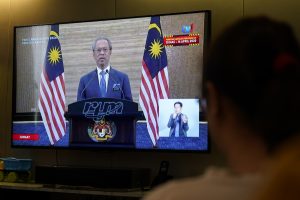Calling for a no-confidence motion against Malaysian Prime Minister Muhyiddin Yassin in parliament this month, Dr Mahathir Mohamad – Muhyiddin’s predecessor — has gone for zugzwang – a German term in chess that denotes a situation for a player when any move will worsen his position. As in zugzwang, Mahathir was compelled to move, knowing full well that ultimately he will be the biggest loser.
Political observers feel that Mahathir, who will be turning 95 in two months, has nothing to lose, but through his latest gambit Mahathir has put his all the Pakatan Harapan coalition partners at a disadvantage — and at the same time put his bete noire, the United Malays National Organization (UMNO), and the Islamist Parti Islam SeMalaysia (PAS) in the driver’s seat.
For the first time in the history of Malaysia, Dewan Rakyat (the lower house of the parliament, whose session begins May 18) will be called to debate and vote on the no-confidence motion. However, given the government business, the no-trust move may not come up until July, giving Muhyiddin ample time further consolidate his position.
Muhyiddin came to power in February in a coup of sorts, by triggering a split between the Pakatan Harapan coalition partners — his party Parti Pribumi Bersatu Malaysia (PPBM) or Bersatu and Anwar Ibrahim’s Parti Keadilan Rakyat (PKR) — to form a minority government under the banner of Perikatan Nasional, with the support of UNMO, PAS, and others.
If Muhyiddin fails to prove his majority in the no-confidence vote, then the House will be dissolved and a new election will be held within six months. The biggest question that the loose coalition partners on both sides of the political divide face is this: do they really want snap elections in the time of COVID-19?
With nobody wanting new elections and fissures deepening in both Mahathir’s Bersatu and Anwar’s PKR, it’s very likely that Muhyiddin may sail through the vote.
However, if UMNO and PAS decide to pull the rug out from under the feet of Muhyiddin, then the fragmented opposition would be no match for them in a general election. During its 22-month rein, the Pakatan Harapan coalition lost Malay support due to a combination of infighting and the domination of the Chinese-inclined Democratic Action Party (DAP).
Arfa’eza Abdul Aziz, a Kuala Lumpur-based communication strategist and former press secretary to the Selangor chief minister, says that, looking at the social media response, Malaysians in general are not very receptive of the recent move.
“The pact [between] Anwar and Mahathir offered nothing new and we have not forgotten how it has failed us,” Arfa’eza said. “Many Malays feel that the Pakatan Harapan government policies and priorities festered negative elements among the non-Muslims to speak ill of Islam and Malays, although the status of both the religion and race is protected by the constitution.”
The coming together of UMNO and PAS, who have been bitter rivals in the past, shows that Malays were hugely disappointed with the performance of the Mahathir-led government, Arfa’eza said, adding that Muhyiddin coming to power with UMNO-PAS support has given a sense of security to the majority Malays.
Most political observers are of the view that, irrespective of the outcome of the no-confidence motion, the Pakatan Harapan can never stage a comeback.
First, it has lost the Malay vote because Malays feel that the Muhyiddin government is moving in the right direction.
Second, whenever elections are held, UMNO and PAS will contest as a team, along with other Barisan Nasional partners.
According to Arfa’eza, “Many were skeptical of UMNO-PAS alliance as both portray themselves as the champion of the Malay cause. However, despite the bitter rivalry of more than 40 years, I think that both parties have finally realized that they have their respective niches and will not overlap. PAS appeals to Malay Muslims more inclined to the religion, while UMNO attracts the nationalists’ type.”
The political arithmetic also favors the UMNO-PAS alliance as in the 14th general election the Malay votes were split three-ways — between UNMO, PAS, and Pakatan Harapan. This will not happen in the next election, as UNMO-PAS has tightened its grip over Malay votes and at the same time Mahathir’s already weakened Bersatu will see further desertions, leaving Pakatan Harapan with no Malay party.
When Mahathir was forced to resign the premiership due to rebellion in his coalition, Bersatu and PKR, he refused to join hands with the “corrupt UMNO,” despite pressure from parties across the political spectrum.
A senior Malaysian journalist says this stand enhanced Mahathir’s reputation, putting him on a very high moral pedestal.
The wily Mahathir is known in Southeast Asian politics for decimating his opponents and allies alike. But his latest no-win move has undone the golden chapter he had scripted by bringing down the Barisan Nasional government, which had ruled Malaysia for more than 60 years.

































